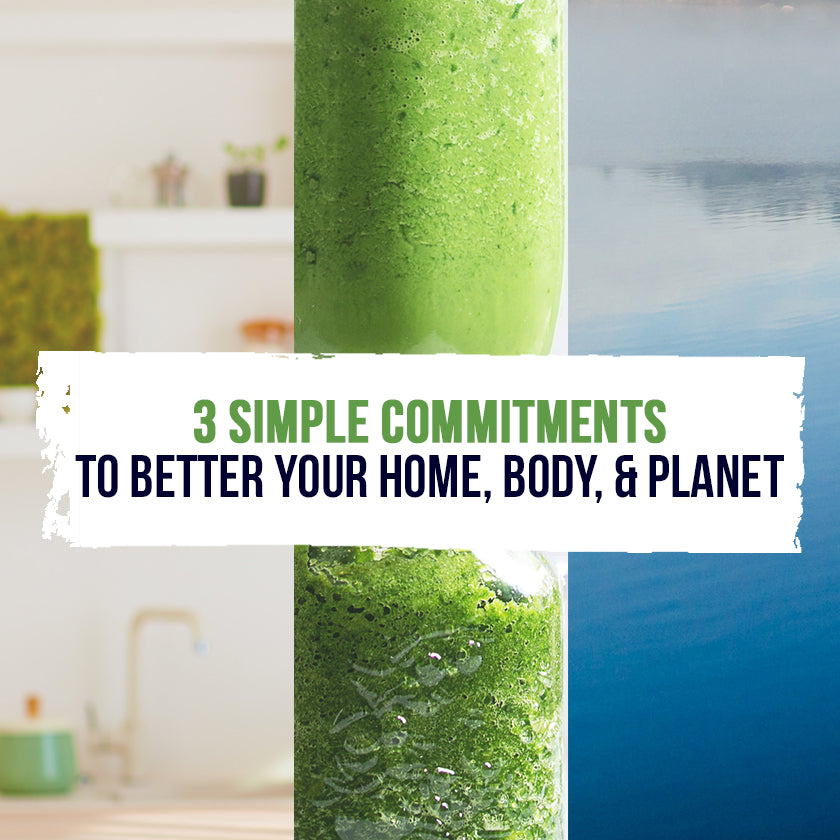
Loading..
My Store
Hours of Operation
Find your nearest store
Results
Loading...

Are you the kind of person who makes resolutions every year, only for them to fall through a couple of weeks into January? According to US News, roughly 80% of resolutions fail by the second week of February, so even if you've never completed one in your life, you're in good company. But don't worry, there is still plenty of time!
We're now a couple of weeks into 2018, so even if you've lapsed, you have almost an entire year to turn things around. And you know what could help your resolutions become one of the 20%? Turning them into commitments. The word "resolution" has become a shorthand for starry-eyed ambitions, but sticking to a diet, living a healthier life, and doing your part to preserve the environment shouldn't be dreams: they should be realities!
So make commitments, these concrete, practical plans that can change not just your year, but your whole life. Here are three simple ideas that can make a world of difference to your body, your home, and... well, the whole world!
Why You’ll Succeed: Eating fruits and veggies is the perfect way to start becoming a healthier person. Even when you fail and eat that doughnut left over in the break room, you’ll know that your new, healthy habits have put you on a solid road to success.
This produce you're consuming should be organic. A lot of people think “organic” is a buzzword, but here in Canada, anything that’s certified organic has to pass third-party certification that has been approved by the Canadian Food Inspection Agency. Producers have to prove that no restricted or prohibited substances have been used on the property in three years: any pesticides, insecticides, herbicides, antibiotics, synthetic hormones, and even GMOs.
Your body will thank you for eating as clean as possible. A 2014 meta-analysis (a look at the results of multiple studies) in the British Journal of Nutrition showed that organic produce had higher levels of antioxidants and lower concentrations of cadmium.[i] Naturally, by eating organic you won't have to deal with pesticides, many of which have been linked to developmental delays in infants[ii], ADHD prevalence[iii], and low sperm count.[iv]
How You’ll Succeed: Make sure you can find everything you love in organic form by shopping at a place that sells only organic produce. You'll know how committed they are by how they treat all their fruits and veggies, not just the popular favourites.
Why You’ll Succeed: We hear so much about outdoor air quality, and how smog, airborne pollutants, and traffic all affect our health, that we forget how important indoor air quality is. This isn't good, because Canadians now spend an estimated 90% of their time indoors![v]
You’ll find success with this one because it’s easy to do, and you’ll feel so much better almost immediately. This is because the common pollutants that come from appliances, chemically treated furniture and household fixtures, unclean vents, and pets can lead to many problems with which you might have come to live: frequent headaches, sore throats, longer colds and illnesses, asthma, and allergic reactions.
How You’ll Succeed: Since it is winter and you’ll probably want to stay indoors the majority of the time, try to clean your air: increase ventilation, clean out your vents, replace furnace filters, and get some houseplants. In the summer, you can run the air conditioning to circulate and filter the air (though you’d probably already run it because it’s hot).
You can also use essential oils to clean the air: chamomile, lemon, eucalyptus, peppermint, and tea tree oils are all very popular and very effective at tackling allergens and purifying your home. If you’re not in a scented mood, Coco Naturals air fresheners have you covered. Made from activated carbon from coconut shells, they do more than just take odors out of the air: bacteria, pollutants, allergens, and even excess moisture are all absorbed.
Why You’ll Succeed: Disposable plastic water bottles, the kind you buy in packs of 24 and keep half-empty in your car, are (not surprisingly) bad for the environment. The consumption of bottles is far ahead of efforts to recycle them, with a million bought every minute around the globe.[vi] Even in Ontario, where an estimated 66% of the bottles end up in recycling, millions are still ending up in landfills. These bottles take hundreds of years to decompose, slowly leaking out their chemicals into the soil and water.[vii]
Even when the plastic is made from materials approved for reuse, most plastics will still leach chemicals into the water.[viii] This is why you should make the upgrade to a reusable bottle made from BPA-free materials like glass and metal that won't leach into your drink. It can save you money, as refill stations are free and everywhere.
How You’ll Succeed: Never leave home without a full and fully reusable bottle of water. Take it to work, the gym, vacations - everywhere. You'll quickly realize that those 24 bottle skids are only good for natural disasters and family reunions.
[i] https://www.ncbi.nlm.nih.gov/pmc/articles/PMC4141693/
[ii] http://fortune.com/2017/07/06/states-sue-epa-dow-pesticide/
[iii] https://www.ncbi.nlm.nih.gov/pubmed/20478945
[iv] http://time.com/3763648/pesticides-diet-fertility/
[v] http://www.parks-parcs.ca/english/ConnectingCanadians-English_web.pdf
[vi] https://www.theguardian.com/environment/2017/jun/28/a-million-a-minute-worlds-plastic-bottle-binge-as-dangerous-as-climate-change
[vii] http://blogs.ei.columbia.edu/2012/01/31/what-happens-to-all-that-plastic/
{"one"=>"Select 2 or 3 items to compare", "other"=>"{{ count }} of 3 items selected"}
Leave a comment